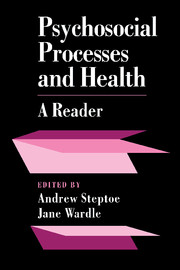Book contents
- Frontmatter
- Contents
- Preface
- Section 1 Life stress, social support and health
- Unemployment and mortality in the OPCS Longitudinal Study
- Job strain, work place social support, and cardiovascular disease: a cross-sectional study of a random sample of the Swedish working population
- Social networks, host resistance, and mortality: a nine-year follow-up study of Alameda County residents
- Goal frustration and life events in the aetiology of painful gastrointestinal disorder 68
- Psychosocial assets, life crisis and the prognosis of pregnancy
- Section 2 Psychophysiological processes in disease
- Section 3 Personality, behaviour patterns and health
- Section 4 Health practices and the modification of health risk behaviour
- Section 5 Coping with illness and disability
- Section 6 Behavioural interventions in medicine
- Index
Social networks, host resistance, and mortality: a nine-year follow-up study of Alameda County residents
from Section 1 - Life stress, social support and health
Published online by Cambridge University Press: 05 August 2016
- Frontmatter
- Contents
- Preface
- Section 1 Life stress, social support and health
- Unemployment and mortality in the OPCS Longitudinal Study
- Job strain, work place social support, and cardiovascular disease: a cross-sectional study of a random sample of the Swedish working population
- Social networks, host resistance, and mortality: a nine-year follow-up study of Alameda County residents
- Goal frustration and life events in the aetiology of painful gastrointestinal disorder 68
- Psychosocial assets, life crisis and the prognosis of pregnancy
- Section 2 Psychophysiological processes in disease
- Section 3 Personality, behaviour patterns and health
- Section 4 Health practices and the modification of health risk behaviour
- Section 5 Coping with illness and disability
- Section 6 Behavioural interventions in medicine
- Index
Summary
Abstract
Berkman, L. F. (Dept. of Epidemiology and Public Health, Yale U., New Haven, CT 06520), and S. L. Syme. Social networks, host resistance, and mortality: A nine-year follow-up study of Alameda County residents. Am J Epidemiol109:186-204, 1979.
The relationship between social and community ties and mortality was assessed using the 1965 Human Population Laboratory survey of a random sample of 6928 adults in Alameda County, California and a subsequent nine-year mortality follow-up. The findings show that people who lacked social and community ties were more likely to die in the follow-up period than those with more extensive contacts. The age-adjusted relative risks for those most isolated when compared to those with the most social contacts were 2.3 for men and 2.8 for women. The association between social ties and mortality was found to be independent of self-reported physical health status at the time of the 1965 survey, year of death, socioeconomic status, and health practices such as smoking, alcoholic beverage consumption, obesity, physical activity, and utilization of preventive health services as well as a cumulative index of health practices.
health surveys; marriage; mortality; smoking; social class; social isolation
Previous research has suggested that social ties and relationships may play a critical role in the determination of health status. Individuals undergoing rapid social and cultural changes (1-5) as well as those living in situations characterized by social disorganization (6-8), and poverty (9-12) appear to be at increased risk of acquiring many diseases. These situations have frequently been described in terms of the absence of stable social ties and resources available to individuals living in such circumstances. Other studies of army wives (13) and men undergoing job loss (14) suggest that social supports may be protective against the harmful health consequences associated with stressful life events.
Furthermore, it repeatedly has been observed that people who are married have lower mortality rates than those who are single, widowed, or divorced (15-17). The relationship between widowhood and increased morbidity and mortality is particularly striking. The results of several investigations (18-21) indicate that widows, especially in the first year following bereavement, have many more complaints about their health, have more mental and physical symptoms, believe they have sustained a lasting deterioration to their health, and have increased mortality rates.
- Type
- Chapter
- Information
- Psychosocial Processes and HealthA Reader, pp. 43 - 67Publisher: Cambridge University PressPrint publication year: 1994
- 27
- Cited by



